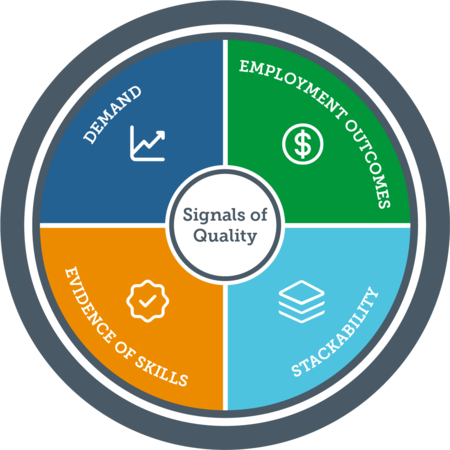Oct. 10, 2023 - As Colorado’s economy evolves, there is an increasing need for Coloradans to develop skills and earn credentials at various stages of life in order to pursue progressive learning and secure good jobs. Quality non-degree credentials can help Colorado’s learners and workers advance while training for occupations needed by employers.
In recognition of the value of non-degree pathways to the workforce, the CWDC and partners including the Colorado Department of Higher Education (CDHE), Colorado Community College System (CCCS), Colorado Department of Education (CDE), and Colorado Succeeds released the Quality and In-demand Non-degree Credentials framework. The framework was developed to create a unified and consistent definition of quality non-degree credentials in the state and outline the process for designating a credential as quality.
Quality non-degree credentials can take many forms including certifications, occupational licenses, Apprenticeship Certificates of Completion, non-credit certificates, micro-credentials (including badges), and sub-baccalaureate for-credit certificates. As the number and type of credentials available in Colorado continues to expand, this framework will help stakeholders make sense of the non-degree credential market and identify non-degree credentials that offer economic benefit.
To be considered a quality and in-demand non-degree credential, the credential must demonstrate each of the four signals of quality outlined in the framework:
- Demand. The credential must align with industry and economic demand. The credential is recognized in the marketplace and leads to job opportunities in growing industries and pathways.
- Evidence of Skills. The credential must have transparent evidence of the skills and competencies learned when earning the credential.
- Employment Outcomes. The credential must have evidence of substantial employment outcomes. There is proof that having the credential either directly leads to jobs paying a living wage in a growing occupation or develops the essential skills and competencies needed for those jobs.
- Stackability. The credential is able to exist as part of a sequence of credentials that can be accumulated over time to build skills and advance an individual’s career and earnings.
In addition to providing a unified and consistent definition of quality non-degree credentials in the state, the framework will be used to:
- Evaluate credentials as directed by SB22-192
- Identify new credentials to be added to the Career Development Incentive Program approved programs list as directed by SB23-065
- Evaluate credentials for inclusion on the Eligible Training Provider List (ETPL)
The framework was developed by partners of the TalentFOUND Network, including multiple stakeholders from business, education, and governmental and non-governmental organizations.
